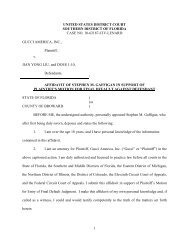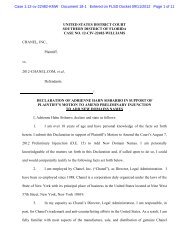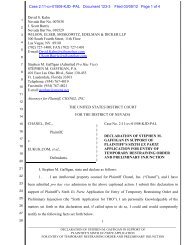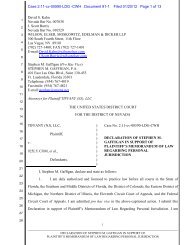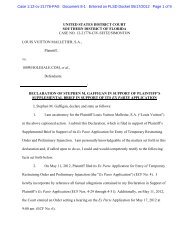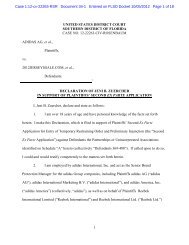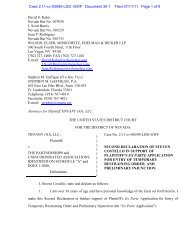UNITED STATES DISTRICT COURT SOUTHERN DISTRICT OF ...
UNITED STATES DISTRICT COURT SOUTHERN DISTRICT OF ...
UNITED STATES DISTRICT COURT SOUTHERN DISTRICT OF ...
Create successful ePaper yourself
Turn your PDF publications into a flip-book with our unique Google optimized e-Paper software.
Case 0:10-cv-61942-MGC Document 5-6 Entered on FLSD Docket 10/14/2010 Page 61 of 75<br />
Article 204. After the prior deduction of bankruptcy expenses from the bankruptcy property, repayment shall be made in the following order:<br />
(1) wages of staff and workers and labour insurance expenses that are owed by the bankrupt enterprise;<br />
(2) taxes that are owed by the bankrupt enterprise; and<br />
(3) bankruptcy claims.<br />
Where the bankruptcy property is insufficient to repay all the repayment needs within a single order of priority, it shall be distributed on a<br />
pro rata basis.<br />
Article 205. The bankruptcy repayment of an enterprise as legal person shall be under the jurisdiction of the people's court in he place<br />
where the enterprise as legal person is located.<br />
Article 206. With respect to the procedure for bankruptcy repayment of enterprises owned by the whole people, the provisions of the Law of<br />
the People's Republic of China on Enterprise Bankruptcy shall apply.<br />
With respect to enterprises without legal personality, individual business, leaseholding farm households and individual partnership, the<br />
provisions of this Chapter shall not apply.<br />
PART THREE PROCEDURE <strong>OF</strong> EXECUTION<br />
CHAPTER XX GENERAL STIPULATIONS<br />
Article 207. Legally effective judgments or orders in civil cases, as well as the parts of judgments or orders that relate to property in criminal<br />
cases, shall be executed by the people's court that tried the case in the first instance.<br />
Other legal documents which are to be executed by a people's court as prescribed by law shall be executed by the people's court in the<br />
place where the person subject to execution has his domicile or where the property subject to execution is located.<br />
Article 208. If in the course of execution a person who is not involved in the case raises an objection with respect to the object of the<br />
execution, the execution officer shall review the objection in accordance with the procedure as prescribed by law. If the objection is<br />
untenable, it shall be rejected; if the objection is tenable, it shall be submitted to the president of the court for an approval of the suspension<br />
of execution. If any definite error is found in the judgment or order, it shall be dealt with in accordance with the procedure for trial<br />
supervision.<br />
Article 209. The execution shall be carried out by the execution officer.<br />
<br />
In carrying out a compulsory execution measure, the execution officer shall show his credentials. After the execution is completed, the<br />
execution officer shall make a record of the particulars of the execution, and have it signed or sealed by the persons concerned on the<br />
scene.<br />
The basic people's court and the intermediate people's court may, in the light of needs, establish executive organs, whose functions shall be<br />
defined by the Supreme People's Court.<br />
Article 210. If a person or property subject to execution is in another locality, the people's court in that locality may be entrusted with<br />
enforcement of the execution. The entrusted people's court shall begin the execution within 15 days after receiving a letter of entrustment<br />
and shall not refuse to do so. After the execution has been completed, the entrusted people's court shall promptly inform the entrusting<br />
people's court, by letter, of the result of the execution. If the execution has not been completed within one month, the entrusted people's<br />
court shall also inform the entrusting people's court, by letter, of the particulars of the execution.<br />
If the entrusted people's court fails to enforce the execution within 15 days after receiving the letter of entrustment, the entrusting people's<br />
court may request the people's court at a higher level of the entrusted people's court to instruct the entrusted people's court to enforce the<br />
execution.<br />
Article 211. If in the course of execution the two parties reconcile themselves and reach a compromise on their own initiative, the execution<br />
officer shall make a record of the terms of the compromise, and both parties shall affix their signatures or seals to it.<br />
If one party fails to fulfill the conciliation agreement, the people's court may, at the request of the other party, resume the execution of the<br />
legal document which is formerly effective.<br />
Article 212. In the course of execution, if the person subject to execution provides surety, the people's court may, with the consent of the<br />
person who has applied for execution, decide to suspend the execution and to defer the time limit for execution. If the person subject to<br />
execution fails again to enforce the execution wi hin the new time limit, the people's court shall have the power to execute the guaranteed<br />
property of the person subject to execution or the property of the guarantor.<br />
Article 213. If the citizen subject to execution dies, his debts shall be paid off from his estate; if a legal person or any other organization as<br />
the party subject to execution terminates, the party that succeeds to its rights and obligations shall fulfill the obligations.<br />
Article 214. After the execution has been enforced in accordance with a judgment or order or other legal documents, if definite error has<br />
been found in such judgment, order or legal document and therefore it has been revoked by the people's court, the people's court shall, with<br />
respect to the property which has been executed, render an order that persons who have obtained the property should return it. In the event<br />
of refusal to return the property, compulsory execution shall be enforced.<br />
Article 215. The provisions of this Part shall be applicable to the execution of conciliation statements as drawn up by the people's court.



